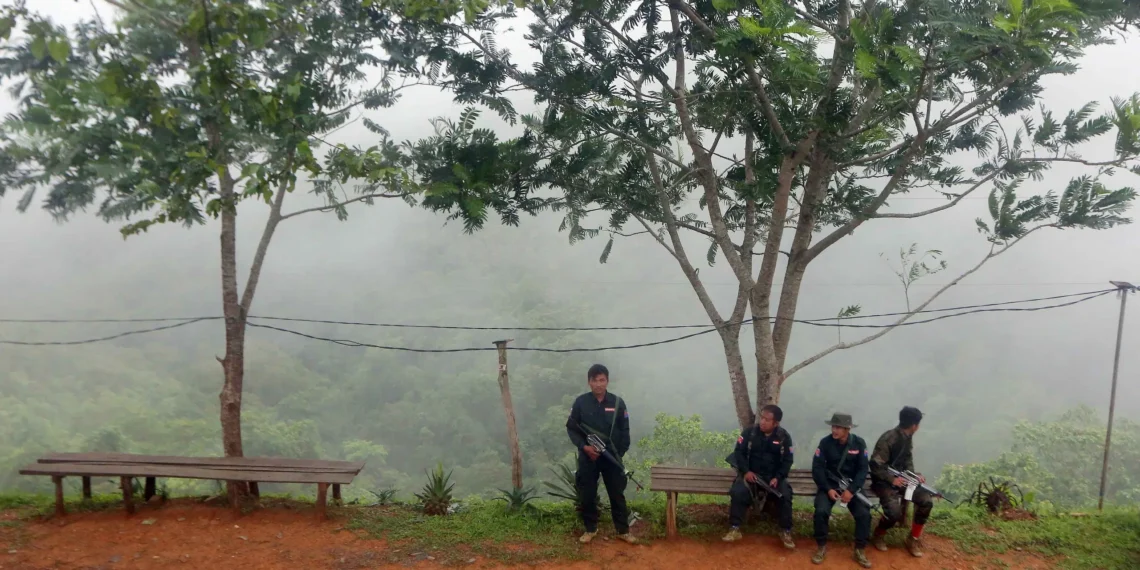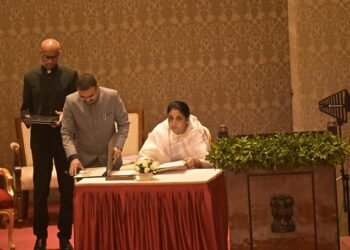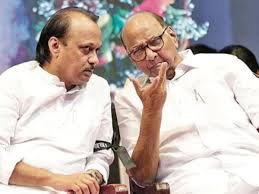BY Navin Upadhyay
In Manipur’s hill districts, nearly 2,000 cadres of Kuki-Zo militant groups—signatories to the Suspension of Operations (SoO) agreement—are facing a severe financial crisis due to the non-payment of their monthly stipends for over two years. Although the Central Government has released the requisite funds, the Manipur state government’s failure to disburse the ₹6,000 monthly stipend has deepened mistrust and exacerbated tensions in an already volatile region. This article examines the reasons behind the delay, its implications for peace, and the broader ethnic strife that continues to complicate the situation.
The SoO Agreement and Its Promises
Signed in 2008, the Suspension of Operations (SoO) agreement was a landmark initiative between the Government of India, the Manipur state government, and 25 Kuki-Zo militant groups, operating under two umbrella organizations—the Kuki National Organisation (KNO) and the United People’s Front (UPF). The agreement required the groups to cease hostilities, confine their cadres to designated camps, and deposit weapons, which are kept under a double-lock system (with one key held by each party) monitored by security forces.
ALSO READ: Assam Rifles Guns Down 10 Militants near Indo-Myanmar Border
In exchange, cadres were promised a monthly stipend of ₹6,000 (increased from ₹3,000 in 2018) and financial assistance to maintain the camps, forming part of a broader rehabilitation package. The pact aimed to open a political dialogue with the Kuki-Zo groups, whose demands have evolved from statehood to a Union Territory with a legislature.
The agreement is reviewed annually by a Joint Monitoring Group (JMG), comprising representatives from the Ministry of Home Affairs (MHA), Indian Army, paramilitary forces, and the state government. The latest extension runs from March 1, 2023, to February 29, 2024.
As of May 2025, the 25 Kuki-Zo groups under the SoO agreement have 2,181 cadres—1,122 affiliated with the KNO and 1,059 with the UPF—spread across 14 designated camps in Kuki-inhabited districts such as Churachandpur, Kangpokpi, Tengnoupal, Chandel, and Senapati.
The Stipend Delay: A Financial and Humanitarian Crisis
Despite the Central Government reimbursing the Manipur state government for the stipends, cadres have not received payments for approximately two years, covering 2023 to 2025. The resulting arrears amount to ₹1.44 lakh per cadre, impacting nearly 2,000 individuals and totaling over ₹28 crore in unpaid stipends.
“It’s a serious humanitarian crisis created by the state government. The Centre reimburses the funds, but the state does not release them. Can anyone explain how these SoO cadres are supposed to survive? The Home Ministry must urgently look into the issue and take corrective steps,”said Dr. Seilen Haokip, spokesperson, KNO
Cadres are barred from engaging in extortion or other illegal activities under the SoO terms and are expected to remain confined to camps, further underscoring the financial hardship caused by the delay.
ALSO READ: Meghalaya Student’s Suicide Raises Alarms at RIMS Imphal
State Government’s Role and Allegations of Bias
Former Chief Minister Biren Singh, who resigned in February 2025, faced sustained criticism for mishandling stipend payments. Despite receiving Central funds, the state government’s irregular disbursement is widely viewed as politically and ethnically motivated.
Since May 3, 2023, Manipur has been gripped by ethnic violence between the valley-based Meitei community and the hill-based Kuki-Zo tribes. The conflict—sparked by a Manipur High Court order (later reversed) recommending Scheduled Tribe status for Meiteis—has claimed over 250 lives and displaced thousands.
Kuki-Zo leaders and civil society groups, including the Indigenous Tribal Leaders Forum (ITLF) and the Committee on Tribal Unity (CoTU), have accused the Biren Singh government of systemic discrimination against hill districts. In a memorandum to Prime Minister Narendra Modi in December 2024, ten Kuki-Zo MLAs—including seven from the ruling BJP—alleged that the state government had failed to ensure essential supplies and development funding for Kuki-dominated areas, citing the exclusion of Churachandpur and Kangpokpi from centrally funded road and healthcare projects.
READ: KOHUR Appeals to NHRC Over Inaction on Ethnic Atrocities in Manipur
The delay in stipend payments is widely perceived as part of this broader pattern of neglect. The state’s attempts to unilaterally withdraw from the SoO with certain Kuki-Zo groups and a February 29, 2024, Manipur Assembly resolution urging the Centre to abrogate the agreement altogether have only worsened the trust deficit.
“It’s not about the amount—₹6,000 is a modest sum—but it reflects a mindset,” said Dr. Seilen, adding, “You can’t starve people and expect them to be angels of peace.”
Central Government’s Role and Oversight Failures
While the Centre has met its financial obligations, its oversight of fund disbursement has been lacking. The Comptroller and Auditor General (CAG) has repeatedly flagged irregularities in stipend payments. A CAG report presented to the Manipur Assembly on March 1, 2024, revealed that ₹27.38 crore in payments between April 1, 2018, and March 31, 2021, were made without mandatory Aadhaar biometric linking.
Instead, payments were issued via cheques to group representatives, raising serious concerns about transparency and accountability. The state government’s explanation—that insurgents failed to provide biometric data—was deemed “not acceptable” by the CAG, especially given that the JMG had discussed this requirement as early as December 2016.
READ: Guwahati Meet: A Defining Moment for the Kuki-Zo Movement
VIOLATIONS
There have also been instances of SoO cadres engaging in activities prohibited under the agreement, such as involvement in violent incidents, desertion of designated camps, and unauthorized possession of arms. For example, a surprise inspection conducted on June 3, 2024, reportedly revealed that only 58% of the registered cadres were present in their designated camps—a significant breach of SoO terms.
Similarly, during search operations carried out on November 2, 2023, in and around Moreh, several armed cadres were found absent from their camps, constituting a direct violation of the agreement’s ground rules.
Implications for Peace and Security
The delayed stipends jeopardize the fragile peace fostered by the SoO agreement. The accord was designed to reintegrate former militants through structured rehabilitation and political dialogue. Neglecting the financial needs of cadres erodes their trust in the state, potentially pushing them toward illegal activities or renewed insurgency.
Kuki-Zo groups have maintained their commitment to the SoO terms, asserting that their cadres have not participated in the ongoing ethnic violence and that weapons remain secured. However, allegations of violations from the state government and calls from Meitei groups to terminate the agreement have intensified tensions.
The ethnic violence since May 2023 has complicated the SoO framework. Kuki-Zo groups claim their “village defense volunteers” are defending hill areas from armed Meitei groups like Arambai Tenggol, while Meitei communities allege that Kuki-Zo militants are behind the violence.W
Way Forward:
To prevent further deterioration of the situation, the following steps are critical:
- Immediate Disbursement of Arrears: The Manipur state government must release the ₹28 crore in arrears to SoO cadres, ensuring transparency through biometric-linked payments.
- Enhanced Central Oversight: The MHA must strengthen the Joint Monitoring Group’s oversight to ensure timely disbursement and prevent misappropriation of funds.
- Inclusive Political Dialogue: The Central Government must accelerate political discussions with both Kuki-Zo and Meitei stakeholders to address the root causes of the ethnic conflict.
- Equitable Resource Allocation: Given allegations of state bias, the Centre should consider routing development funds directly to hill districts through elected tribal representatives.
READ: Opinion: MP Minister Must Be Fired for Slandering Nation’s Pride
The delay in stipend payments to nearly 2,000 Kuki-Zo cadres is not merely a financial oversight—it is a symptom of deeper governance failures and ethnic mistrust. The state government’s reluctance to release Central funds, coupled with allegations of bias and mismanagement, has undermined the SoO agreement and fueled calls for separate administrative arrangements.
With Manipur under President’s Rule since February 2025, the Central Government must act swiftly to restore trust, ensure fair treatment of all communities, and prevent the fragile peace from unraveling.













